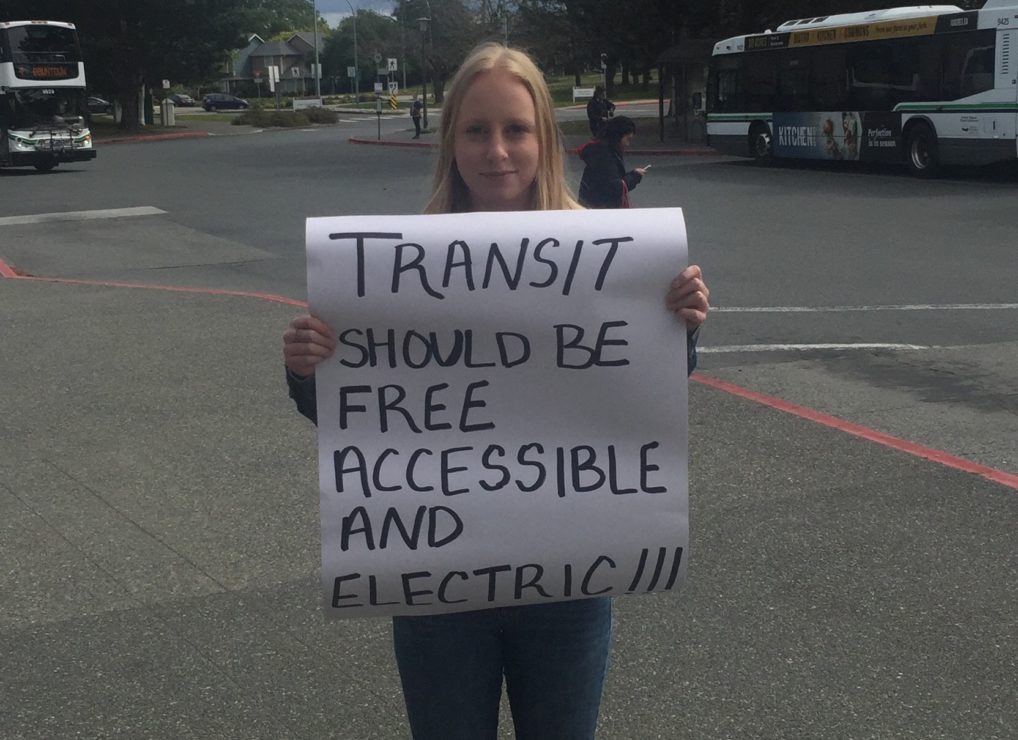In their first meeting of the year, the board passed a motion that would see a pilot program grant free transit to riders under 19

At the first meeting of their new term, the University of Victoria Student Society (UVSS) Board of Directors unanimously voted to publicly support a call for sustainability-focused changes to the current transit system, including a pilot program that would grant free transit to everyone under 19.
The same motion, directed at the Victoria Regional Transit Commission and BC Transit, was passed by the Victoria City Council on April 25.
“The UVSS represents the largest ridership stakeholder group in Greater Victoria, so I took it as our job to advocate for better transit especially in electrifying and reducing the costs,” said Juliet Watts, the UVSS Director of Campaigns and Community Relations and also a non-voting member of the Victoria Regional Transit Commission.
A focal part of the motion called on BC Transit and the Victoria Regional Transit Commission to develop a plan to phase out transit fees by 2022, starting with a pilot program in 2020 to eliminate fees for everyone younger than 19.
Currently, full-time UVic students pay $81 for a semester-long bus pass. A monthly bus pass costs $85, or $45 for people over 65 or under 19.
This motion also described the need for an expanded network of bus lanes and fleet of buses, along with the electrification of transit buses.
The clauses of the motion state that there is precedent for the elimination of public transit user fees — citing Kingston, Ont., and the European countries of Luxembourg and Estonia, as examples of places that are in the process of reconfiguring their transit fees to come out of taxes, not the fare box.
Watts, who was involved in the Capital Region District’s recent decision to declare a state of climate emergency, said she and her group Community Climate Action and Divestment worked closely with Victoria city Councillors Ben Isitt and Sharmarke Dubow in discussing this motion.
“More than half the emissions in our region are from transportation,” Watts said. “Switching from private vehicles to public transit has the potential to make a very large impact in achieving carbon neutrality.”
“I think, arguably, eliminating financial barriers in electrifying our transit systems is the best way that local governments can reduce community-based emissions.”
Going forward, Watts is looking to help bring this motion to Saanich city council, where she has seen “a little bit more resistance and need for clarification” than in Victoria.
She is also looking to bring the values of this motion into the UVSS’ Better Transit campaign, which was started several years ago and has previously focused on the creation of a summer U-Pass. Now that the summer U-Pass has been implemented, Watts hopes to expand this campaign and allow students to sign a petition urging BC Transit and the Victoria Regional Transit Commission to support these changes.
“The average age of undergraduate students at UVic is approximately 21 years of age, and so we are the people who will inherit the global climate crisis,” said Watts. “As their representatives, it is our job to advocate for the best practices.”
Catch up on what you missed at the May 6 UVSS Board of Directors meeting with our live coverage here. The next meeting will be on May 13 at 6 pm in the Student Union Building Upper Lounge.






